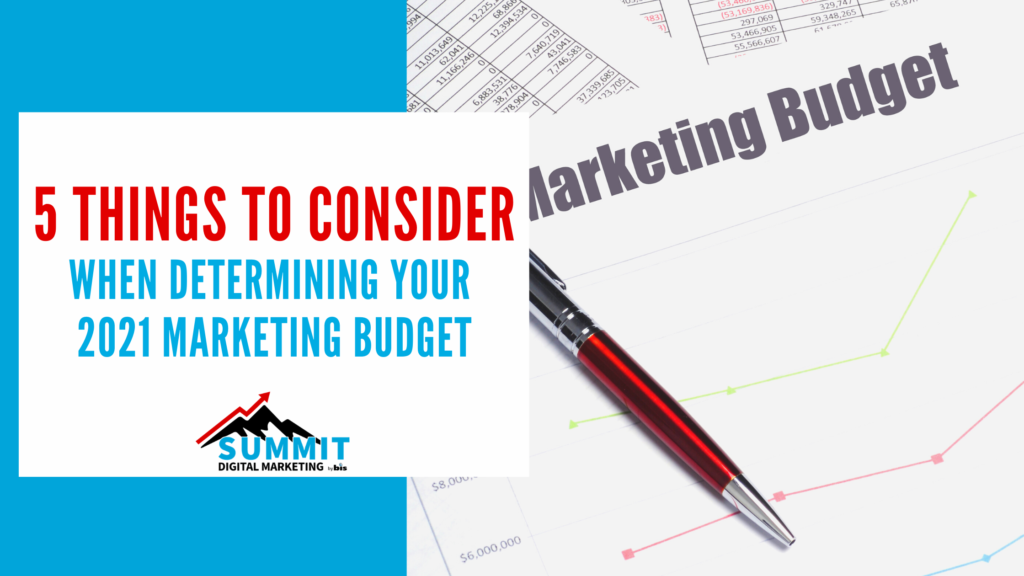Budgeting for new office pens? Easy. Allowing for your monthly IT bill? A breeze. Determining your yearly marketing budget? Not so much.
If the thought of creating your 2021 marketing budget makes you hit the mental brakes, you’re not alone. By nature, marketing is one of the hardest categories to budget for because it directly impacts your business growth but can often feel unpredictable and even stagnant. However, we’ve found that 5 key considerations can make it easy to take your 2021 marketing budget from to-do to TA-DA!
Before you sit down with your accounting team and executives, here’s what you need to know:
1. Your business goals
Like any solid business plan, your marketing strategy should begin with the end in mind. When setting your annual marketing budget, it’s important to know what you want to achieve so you can decide how much you’ll need to achieve it.
For example, you may want to:
- Make more sales
- Increase lead generation
- Boost brand awareness
- Earn more subscribers
- Increase website traffic
Once you’ve established your goals, it’s time to get even more specific. Ask yourself which goals are most important, and how soon do you want to see progress? For example, you may say “I want to boost sales by 15% in the first quarter.” This type of specific goal is highly actionable and easier to account for.
If you have trouble nailing this down, ask yourself where you want your business to be after the first month, the first quarter, and the first year.
2. Your Operational Costs
Next, you’ll want to break down your actual operating costs. Consider things like:
- How much time and labor will it cost to execute your future marketing plan?
- Can your current staff handle the new workload, or will you need to add extra employees?
- Would it be more cost-effective to outsource the work to a seasoned agency like ?
- Can you afford the cost of reducing your market share due to inaction?
3. The lifetime value of your ideal client/customer
It would be great if we could spend a dollar to make a million, but that’s rarely how it works. You should instead consider what value your ideal customer will bring your business over the lifetime of your relationship.
If your services are more expensive, you’ll likely need to spend more money and time per client to earn their trust and loyalty – but you’ll receive a bigger payoff in the long-run. If your business instead relies on a high number of low-paying clients, you’ll need to spend less per client to get the same results.
4. Your Choice in Marketing Strategies
To get the most bang for your buck, you need to focus on the marketing efforts that will best fit your business and help you reach your future goals. Different marketing mediums have different costs, so deciding which to focus on will help you nail down your marketing budget more accurately.
For example, a B2B business may get the most traction from making connections with authoritative content on LinkedIn. On the other hand, an ECommerce company may want to focus on boosting their business website and promoting PPC advertising on Facebook or Instagram.
A few helpful questions to get the ball rolling:
- Where does your target audience spend their time online?
- Will your business benefit more from inbound or outbound marketing?
- What new trends can you use to get ahead of the game?
5. Your marketing budget is an investment, not a cost.
It’s important to remember that marketing is not an expense, but an investment. Although you may want to allocate your marketing budget the same way you would budget for new office pens, it’s not the same thing. Every dollar you spend boosting your business through marketing will present a return on investment (ROI), even if it’s not right away.
In that sense, your marketing budget should focus equally on growth and retention. If sales last year were low, it’s easy to think you should slash your marketing budget to recoup. You should increase your spending in order to return sales to a healthy range.
Ultimately, your marketing budget will be a combination of what you can afford and how far you want to go. Of course, it never hurts to have an expert team on your side to help you navigate the ever-changing market! If you need help creating your budget or implementing your marketing strategy, contact us today!











